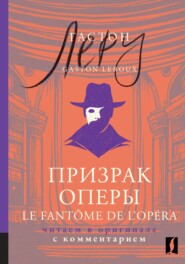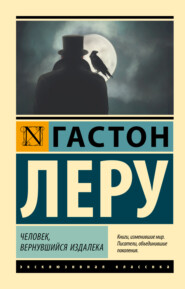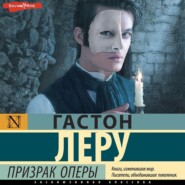По всем вопросам обращайтесь на: info@litportal.ru
(©) 2003-2025.
✖
The Double Life
Автор
Год написания книги
2018
Настройки чтения
Размер шрифта
Высота строк
Поля
“Strange, very strange!”
“Yes, indeed. You must trust my little yellow arm.”
“Inexplicable.”
“There is nothing more inexplicable.”
“There are things more inexplicable still than that which have happened.”
“What, then?”
“A carriage without a locomotive appeared and disappeared, and no one could tell from whence it came. It disappeared, as it appeared.... Did you not see a carriage with a man at the door pass by here?”
“Monsieur,” said the signalman angrily, “you mock me! You are exaggerating because you do not believe the story of the express which did not come. But look, monsieur, at my signal; that is proof enough. It cannot make a mistake.”
M. Longuet replied to the signalman: “If you did not see the express, neither did I.”
In that “neither did I” commenced the inward thoughts of M. Longuet, who went away in Signor Petito’s clothes. M. Longuet had an idea. His misfortune was so extreme and so incurable that he resolved to die for the others. With a little cunning this was possible, since he had reclothed himself in Signor Petito’s clothes. Nothing would hinder him from leaving his on the bank of the first river he came to.
This would constitute a suicidal act, according to the law.
M. Longuet was moved to the thought of addressing a letter to Marceline and Adolphe. On the banks of what river would he put his clothes? How could he re-enter Paris? However, these thoughts passed through his head momentarily, for there was only one thing which was really of importance to him, and that was the explanation of the disappearance of the train.
This explanation was given to Théophraste by M. Mifroid, under the circumstances which we shall now report.
CHAPTER XXIX
M. Milford Recognizes Cartouche
AT midnight an artisan was singing in a square in Paris, at the side of the ancient Quarter d’Enfer, the hymn which several months later became so popular, the “International.” That artisan was working with several companions repairing the track, which had sustained certain damages, following the construction of a new drain. The track was bent in certain places, and even a house in that situation, a heavy new house of seven stories, was leaning. The city engineers were much concerned by this state of affairs. They knew that in this quarter the catacombs projected their innumerable tunnels, their thousands of drains, and that certain buildings were in a very precarious state.
There are ancient Gallic-Roman quarries under those tottering walls, and so they determined on some work to make these houses secure.
The day which interests us saw the end of this work. The artisan who sang the “International” had, with his companions, completed the stopping of a hole in the subterranean vault that they had previously strengthened with very heavy pillars, several meters high.
It was just about twilight when they relinquished their work, and the workman who sang the “International” had almost finished stopping up the hole at that hour.
At the same hour, not far away on the square, in front of an electrical lamp store, a few people stood about on the pavement, and M. Mifroid was buying a few lamps for his men. He had paid for them and was just leaving the store with his package, when he saw in front of the store a young man with white hair. He was so taken aback that he slipped into his pockets, without having paid for them, several electrical lamps. Always courageous, M. Mifroid bounded toward the man, crying: “It is Cartouche!” He had recognized him, for since the revenge of the calf, all the commissioners of police had the portrait of Cartouche in their pockets. We should add that Mme. Longuet herself, and M. Lecamus, immediately after the reading relative to the calf, had shut M. Longuet up, with the design of sending an urgent communication to the nearest Commissariat.
Then M. Mifroid, who had known our hero as Théophraste, when he had dined with him, and who recognized him as Cartouche, cried out in bounding toward him: “It is Cartouche!”
Théophraste had known for days what the police wanted with him, and when he saw Mifroid and heard the words “It is Cartouche!” he said to himself: “It is time for me to get out of this.” And he ran down the street.
The commissioner ran on behind him, and was just grabbing him by the collar, when they both fell down the hole which the workman was filling.
The man had left for a few minutes to drink with his companions at the saloon near by, and on his return he completed his work, not knowing that the two men had fallen, and so they were imprisoned.
CHAPTER XXX
M. Mifroid’s Theory
WHEN M. Mifroid recovered sufficiently from the shock of his fall, the first thing that worried him was that he would be “out of the game.” Even at the moment of his fall his presence of mind did not fail him, and he knew that he was falling into one of the thousand-year-old quarries, which crossed under Paris in their intricate meanderings. He experienced that feeling accompanied by a light, painful torpor which follows a swoon caused by shock.
He was in the catacombs!
His first thought was to try and find the lights which he had just bought, and so find out how the passage lay. He felt sure that they must have fallen through the hole with him. The darkness seemed to weigh heavily on his eyelids, and a great feeling of depression came over him. Without getting up, for by an imprudent movement he would lose the knowledge of the exact place where he had fallen, he spread his hands about him and was relieved to find his package again. He feared at first that the lamps would be broken, but soon felt that it was not so; and breaking open the package, he pressed the button on one of the lamps. The cavern was lighted with a fairy brightness, and he could not keep from smiling as he thought of the unfortunates who, shut up in some cavern, generally drag themselves along, holding their breath, behind a paltry snuff of a candle, which at any moment might flicker out.
He got up then and examined the vault. He knew of the work of repairing the track, and knew that they neared the end, but when he saw that the hole through which he had fallen was closed, a feeling akin to fear came over him.
Now some meters of earth separated him from the outside world, unless it was possible for him to get up to this place which they had filled in. He, however, flashed his light around, and after surveying the walls and the vaults, he came across a prostrate body. The sight at first gave him a shock, but on examination he found it to be the body of M. Longuet-the body of the new Cartouche. He examined it and noticed that it did not bear a single trace of serious wounds. The man was stunned, as he had been himself, and without doubt he would not be slow in coming out of that swoon. He recalled that M. Lecamus had presented him to his friend in the Champs Elysées, and behold, he was now mixed up with him like the worst kind of assassins.
Just then M. Longuet breathed a sigh, stretched his arm, and complained of some pains. He arose, and, saluting M. Mifroid, asked him where they were. M. Mifroid told him. He did not seem at all distressed, but drawing forth his portfolio, he traced some lines which resembled a plan, and showed them to M. Mifroid, saying:
“M. le Commissioner, we are at the bottom of the catacombs. It is an extraordinary event. How we are going to get out I do not know, but that which is distressing me most at the present moment is what has happened to the express train.” M. Mifroid demanded some explanation, and M. Longuet related to him, with the closest detail, the disappearance and re-appearance of the carriage and the train. For the better understanding of the track he drew a plan out as follows:
A H D C B
This he showed to M. Mifroid.
He explained how the train had disappeared between A and B. How he had turned the switch at H and waited at D for the train to pass on to the side track. He described how the train had never come, and how the carriage had appeared and disappeared.
M. Mifroid became greatly interested, and begged him to repeat the story. “And when did this happen?” asked he. “It has not yet been reported to me.”
“It happened several hours ago,” said Théophraste, “and it should have been reported by now.”
M. Mifroid examined the plan for about five minutes, and after reflecting for a while, asked Théophraste a few questions. Suddenly he burst out laughing and said: “Why, what a difficult problem. I have solved it in five minutes.
“You said there were five men at A and five men at B. It passes through B, but not A. You were at D, and because you did not see, it did not pass? Consequently, your train vanished. Well, I say the train exists between A and B, and must be somewhere between B and I, that is sure; the train is in the sandhill.”
“I swear not!” said Théophraste. “I was at D expecting the train, and I did not leave the track.”
“It can be nowhere else, for five men saw it pass B and the five men at A are equally certain it didn’t pass them. Therefore I say that as only you were at D it passed that point, and undoubtedly switched off on I, since it could not be otherwise. By a necessary chance, while the first cars of the train were engulfed in the sand hillock, which covered it up (imagine that the line H is too short for the engineer to have had time to avoid the accident), the yoke chain of the last car was broken, and so the last carriage was forced by the baggage car to descend as far as D, on the track, which was slightly up-grade, since it wrent into a sand hillock. Then after going down to H and back to D, you saw the carriage and Signor Petito in the doorway. Your Signor Petito opened the carriage door, perhaps to throw himself out, as soon as he was aware of the imminent catastrophe, and as the latter caused a shock, it closed the door on the head of your Signor Petito.
“Now, having despoiled Signor Petito of his clothing, you walk into the fields to read his papers. When you return the carriage is no longer there. Now, then. Since there was a declivity, and since there was a wind, the carriage, after having rolled as far as H, is found on the line A-B, where the trainmen certainly have found it by this time. Do you understand now? Do you understand all except that you did not see the train pass D? You are deaf sometimes, M. Longuet?”
“I have already had the honor of telling you so.”
“Imagine that you were deaf while you were waiting for the train at D. You did not hear then?”
“No, but I should have seen it.”
“Already you did not hear it. That is much. Possibly you turned your head for three seconds. Three seconds, that is to say, one second and thirty hundredths longer than is necessary to see an express train of four carriages pass before you, which, being late, made 120 to the hour. M. Longuet, the train disappeared, or, rather, seemed to disappear, because you were deaf and turned your head for a brief space of time.”
M. Longuet raised his arms to the limit toward the vaults of the catacombs.
CHAPTER XXXI
Lost in the Catacombs
“Yes, indeed. You must trust my little yellow arm.”
“Inexplicable.”
“There is nothing more inexplicable.”
“There are things more inexplicable still than that which have happened.”
“What, then?”
“A carriage without a locomotive appeared and disappeared, and no one could tell from whence it came. It disappeared, as it appeared.... Did you not see a carriage with a man at the door pass by here?”
“Monsieur,” said the signalman angrily, “you mock me! You are exaggerating because you do not believe the story of the express which did not come. But look, monsieur, at my signal; that is proof enough. It cannot make a mistake.”
M. Longuet replied to the signalman: “If you did not see the express, neither did I.”
In that “neither did I” commenced the inward thoughts of M. Longuet, who went away in Signor Petito’s clothes. M. Longuet had an idea. His misfortune was so extreme and so incurable that he resolved to die for the others. With a little cunning this was possible, since he had reclothed himself in Signor Petito’s clothes. Nothing would hinder him from leaving his on the bank of the first river he came to.
This would constitute a suicidal act, according to the law.
M. Longuet was moved to the thought of addressing a letter to Marceline and Adolphe. On the banks of what river would he put his clothes? How could he re-enter Paris? However, these thoughts passed through his head momentarily, for there was only one thing which was really of importance to him, and that was the explanation of the disappearance of the train.
This explanation was given to Théophraste by M. Mifroid, under the circumstances which we shall now report.
CHAPTER XXIX
M. Milford Recognizes Cartouche
AT midnight an artisan was singing in a square in Paris, at the side of the ancient Quarter d’Enfer, the hymn which several months later became so popular, the “International.” That artisan was working with several companions repairing the track, which had sustained certain damages, following the construction of a new drain. The track was bent in certain places, and even a house in that situation, a heavy new house of seven stories, was leaning. The city engineers were much concerned by this state of affairs. They knew that in this quarter the catacombs projected their innumerable tunnels, their thousands of drains, and that certain buildings were in a very precarious state.
There are ancient Gallic-Roman quarries under those tottering walls, and so they determined on some work to make these houses secure.
The day which interests us saw the end of this work. The artisan who sang the “International” had, with his companions, completed the stopping of a hole in the subterranean vault that they had previously strengthened with very heavy pillars, several meters high.
It was just about twilight when they relinquished their work, and the workman who sang the “International” had almost finished stopping up the hole at that hour.
At the same hour, not far away on the square, in front of an electrical lamp store, a few people stood about on the pavement, and M. Mifroid was buying a few lamps for his men. He had paid for them and was just leaving the store with his package, when he saw in front of the store a young man with white hair. He was so taken aback that he slipped into his pockets, without having paid for them, several electrical lamps. Always courageous, M. Mifroid bounded toward the man, crying: “It is Cartouche!” He had recognized him, for since the revenge of the calf, all the commissioners of police had the portrait of Cartouche in their pockets. We should add that Mme. Longuet herself, and M. Lecamus, immediately after the reading relative to the calf, had shut M. Longuet up, with the design of sending an urgent communication to the nearest Commissariat.
Then M. Mifroid, who had known our hero as Théophraste, when he had dined with him, and who recognized him as Cartouche, cried out in bounding toward him: “It is Cartouche!”
Théophraste had known for days what the police wanted with him, and when he saw Mifroid and heard the words “It is Cartouche!” he said to himself: “It is time for me to get out of this.” And he ran down the street.
The commissioner ran on behind him, and was just grabbing him by the collar, when they both fell down the hole which the workman was filling.
The man had left for a few minutes to drink with his companions at the saloon near by, and on his return he completed his work, not knowing that the two men had fallen, and so they were imprisoned.
CHAPTER XXX
M. Mifroid’s Theory
WHEN M. Mifroid recovered sufficiently from the shock of his fall, the first thing that worried him was that he would be “out of the game.” Even at the moment of his fall his presence of mind did not fail him, and he knew that he was falling into one of the thousand-year-old quarries, which crossed under Paris in their intricate meanderings. He experienced that feeling accompanied by a light, painful torpor which follows a swoon caused by shock.
He was in the catacombs!
His first thought was to try and find the lights which he had just bought, and so find out how the passage lay. He felt sure that they must have fallen through the hole with him. The darkness seemed to weigh heavily on his eyelids, and a great feeling of depression came over him. Without getting up, for by an imprudent movement he would lose the knowledge of the exact place where he had fallen, he spread his hands about him and was relieved to find his package again. He feared at first that the lamps would be broken, but soon felt that it was not so; and breaking open the package, he pressed the button on one of the lamps. The cavern was lighted with a fairy brightness, and he could not keep from smiling as he thought of the unfortunates who, shut up in some cavern, generally drag themselves along, holding their breath, behind a paltry snuff of a candle, which at any moment might flicker out.
He got up then and examined the vault. He knew of the work of repairing the track, and knew that they neared the end, but when he saw that the hole through which he had fallen was closed, a feeling akin to fear came over him.
Now some meters of earth separated him from the outside world, unless it was possible for him to get up to this place which they had filled in. He, however, flashed his light around, and after surveying the walls and the vaults, he came across a prostrate body. The sight at first gave him a shock, but on examination he found it to be the body of M. Longuet-the body of the new Cartouche. He examined it and noticed that it did not bear a single trace of serious wounds. The man was stunned, as he had been himself, and without doubt he would not be slow in coming out of that swoon. He recalled that M. Lecamus had presented him to his friend in the Champs Elysées, and behold, he was now mixed up with him like the worst kind of assassins.
Just then M. Longuet breathed a sigh, stretched his arm, and complained of some pains. He arose, and, saluting M. Mifroid, asked him where they were. M. Mifroid told him. He did not seem at all distressed, but drawing forth his portfolio, he traced some lines which resembled a plan, and showed them to M. Mifroid, saying:
“M. le Commissioner, we are at the bottom of the catacombs. It is an extraordinary event. How we are going to get out I do not know, but that which is distressing me most at the present moment is what has happened to the express train.” M. Mifroid demanded some explanation, and M. Longuet related to him, with the closest detail, the disappearance and re-appearance of the carriage and the train. For the better understanding of the track he drew a plan out as follows:
A H D C B
This he showed to M. Mifroid.
He explained how the train had disappeared between A and B. How he had turned the switch at H and waited at D for the train to pass on to the side track. He described how the train had never come, and how the carriage had appeared and disappeared.
M. Mifroid became greatly interested, and begged him to repeat the story. “And when did this happen?” asked he. “It has not yet been reported to me.”
“It happened several hours ago,” said Théophraste, “and it should have been reported by now.”
M. Mifroid examined the plan for about five minutes, and after reflecting for a while, asked Théophraste a few questions. Suddenly he burst out laughing and said: “Why, what a difficult problem. I have solved it in five minutes.
“You said there were five men at A and five men at B. It passes through B, but not A. You were at D, and because you did not see, it did not pass? Consequently, your train vanished. Well, I say the train exists between A and B, and must be somewhere between B and I, that is sure; the train is in the sandhill.”
“I swear not!” said Théophraste. “I was at D expecting the train, and I did not leave the track.”
“It can be nowhere else, for five men saw it pass B and the five men at A are equally certain it didn’t pass them. Therefore I say that as only you were at D it passed that point, and undoubtedly switched off on I, since it could not be otherwise. By a necessary chance, while the first cars of the train were engulfed in the sand hillock, which covered it up (imagine that the line H is too short for the engineer to have had time to avoid the accident), the yoke chain of the last car was broken, and so the last carriage was forced by the baggage car to descend as far as D, on the track, which was slightly up-grade, since it wrent into a sand hillock. Then after going down to H and back to D, you saw the carriage and Signor Petito in the doorway. Your Signor Petito opened the carriage door, perhaps to throw himself out, as soon as he was aware of the imminent catastrophe, and as the latter caused a shock, it closed the door on the head of your Signor Petito.
“Now, having despoiled Signor Petito of his clothing, you walk into the fields to read his papers. When you return the carriage is no longer there. Now, then. Since there was a declivity, and since there was a wind, the carriage, after having rolled as far as H, is found on the line A-B, where the trainmen certainly have found it by this time. Do you understand now? Do you understand all except that you did not see the train pass D? You are deaf sometimes, M. Longuet?”
“I have already had the honor of telling you so.”
“Imagine that you were deaf while you were waiting for the train at D. You did not hear then?”
“No, but I should have seen it.”
“Already you did not hear it. That is much. Possibly you turned your head for three seconds. Three seconds, that is to say, one second and thirty hundredths longer than is necessary to see an express train of four carriages pass before you, which, being late, made 120 to the hour. M. Longuet, the train disappeared, or, rather, seemed to disappear, because you were deaf and turned your head for a brief space of time.”
M. Longuet raised his arms to the limit toward the vaults of the catacombs.
CHAPTER XXXI
Lost in the Catacombs

















